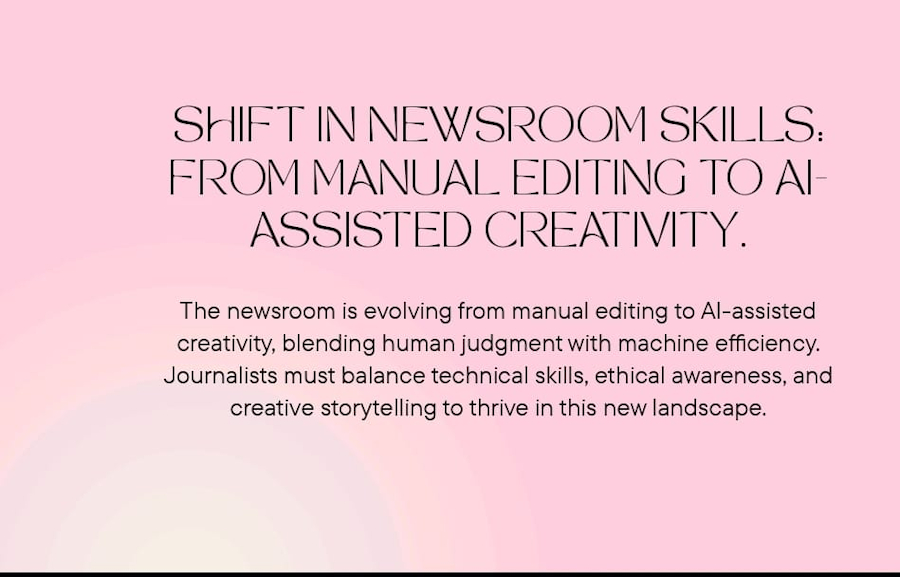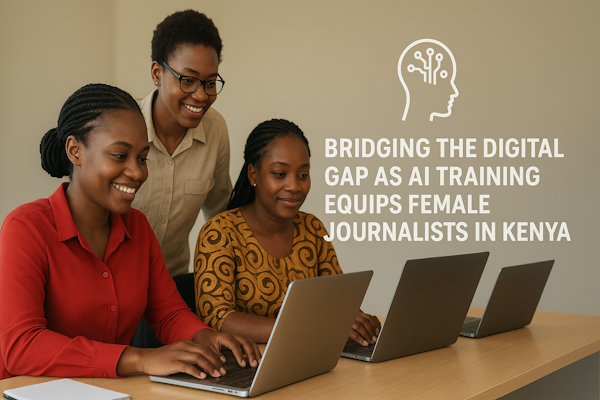By Stephanie Ayieta
Media houses play a significant role in helping journalists adapt to technology. Research by IAWRT Kenya found that the level of support by media organizations varies from one media house to another. The support manifests in various ways including:
Paying for software subscriptions to help journalists and technical staff access premium services and versions of the media tools they use to source for, edit, and disseminate or broadcast content. In the technology era, we have seen the automation of tasks that previously consumed time and needed some level of expertise. All it takes now is subscribing to essential software licenses, including Adobe Creative Suite or Canva, for creative projects is necessary.

AI tools have been made available to perform tasks such as Video previewing, Editing, Captioning, Generating Own Sound, Creating AI-generated images and videos, and Deep Research among many other things. Some of the well-performing AI tools performing these functions are: Chat GPT, Gemini, and Claude (Chatbots that perform various tasks including but not limited to: deep research, video interpretation, and specific job strategies as prompted).
There are AI search engines that are helping journalists maximize SEO like Perplexity, Phind, and Liner. For image generation, there is Mid-journey, Re-craft, and Leonardo. Some video generation tools are: Runway, Sora (by ChatGPT), and Adobe Firefly. Editing has been made easy thanks to tools such as ADOBE, Descript, and Capcut. For digital content, journalists can use AI clone-making tools such as HeyGen and Synthesia. Opus Clip helps in trimming long videos to short clips for social media.
For Voice editing, there are a variety of tools offered such as Turbo Scribe and Transcripter for Transcribing. Eleven Labs is best for voice cloning and generating sound effects, and Alitu for voice editing.
Digital media tools that are great for productivity and workflow efficiency are Zapier and make.com. These are automation tools, which perform all tasks from scripting to posting on social media.
Most of these tools have a free package. However, to access the efficient services offered which are valuable to journalists, payments have to be made. The average price for a basic package is $20. It might therefore be costly for an individual to access all of the above-mentioned software tools hence the need for the media houses to step in.
Training and Capacity Building is the other form of support the organizations can provide. This is through regular training sessions on emerging technologies, software, and digital tools. They can encourage access to online learning platforms like LinkedIn Learning, and Coursera for skill development. Hosting workshops or webinars on integrating technology into daily workflows, such as video editing, content management systems, or analytics helps to empower its employees. Most media houses have in-house workshops to train journalists on the available technological tools – both hardware and software – for their journalistic work and content creation and dissemination.
The adoption of the software requires compatible machines. The company therefore needs to purchase the latest tools and machines like desktops and high-performance laptops that are to perform the various tasks, this also includes purchasing digital audio recording gadgets as well as editing software.
Creating a conducive environment to allow journalists to apply the technological skills acquired is necessary, as it will foster a culture of experimentation. For instance, allowing teams to experiment with emerging technologies such as augmented reality (AR), virtual reality (VR), and AI-driven analytics without fear of failure.
The media houses should also push for a Digital-First Culture. This encourages innovation by prioritizing digital strategies for convergence, such as podcasts, live streams, and short-form videos. Providing platforms and incentives to explore new technologies like AI for content generation or data visualization tools for storytelling. They should also be willing to embrace remote and hybrid work by Investing in cloud-based collaboration tools like Google Workspace, Slack, and Zoom to enable seamless remote work.

Mentorship and Peer Learning are key to the successful transition of journalists to technology. Encouraging mentorship programs where tech-savvy team members assist others in adopting and maximizing the use of technology will not only help build unity and cohesion but is also sustainable. This is achieved through fostering an environment where knowledge sharing is part of the organizational culture.
Actively seeking feedback from employees on the challenges they face with technology helps boost the organization’s systems. This facilitates the Improvement of tools, training, and processes based on the feedback received to ensure user-friendly solutions.
Policies need to be implemented to bridge digital gaps. Such policies address the digital divide by offering accessible devices and reliable internet support, especially for field teams. This can be realized through providing Wi-Fi, airtime, and data bundles where necessary so that journalists can keep in touch with newsmakers, and carry out proper research, be it online or offline, for their projects. It also includes advocating for inclusive technology adoption by considering the specific needs of diverse staff. It includes offering unconditional permission to employees invited to attend workshops organized by media partners and stakeholders for technology growth.
These solutions need concerted efforts to successfully support women journalists in technology adoption.




